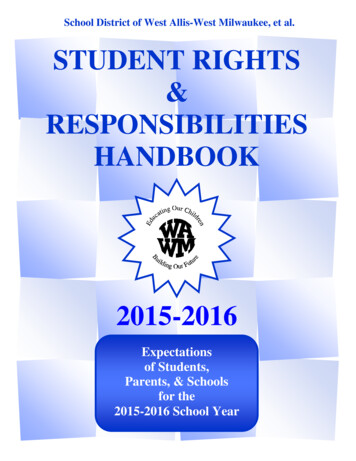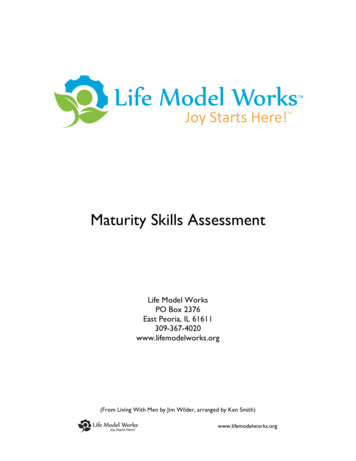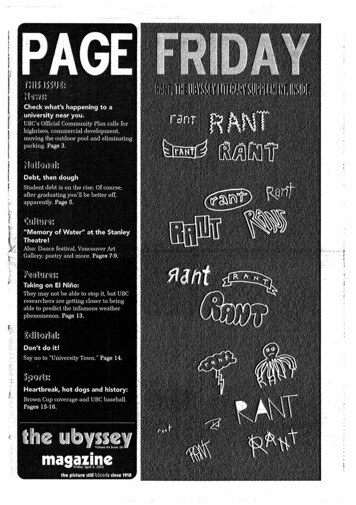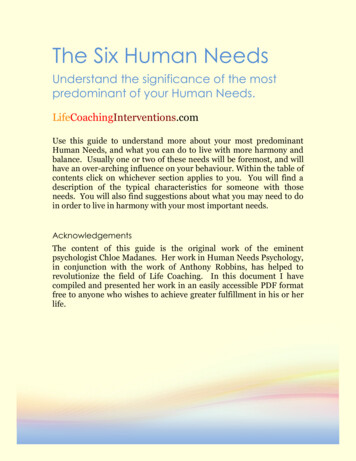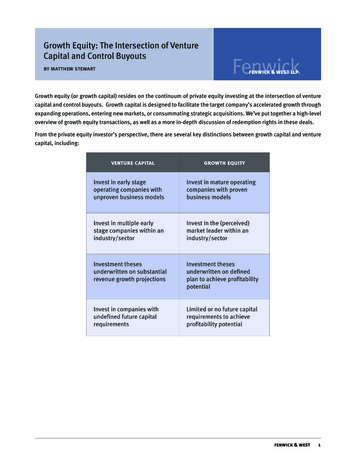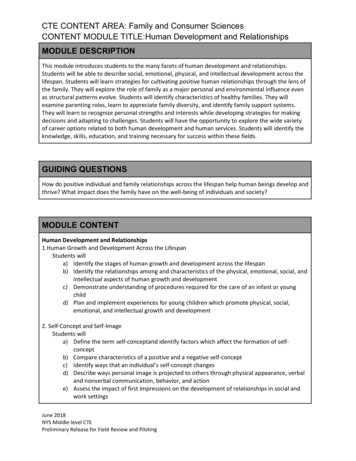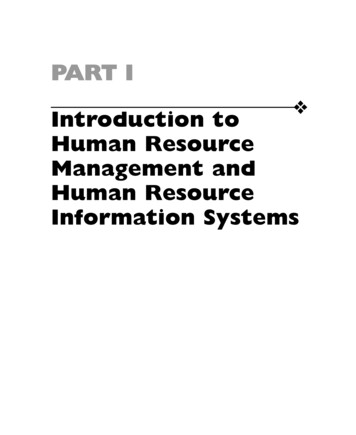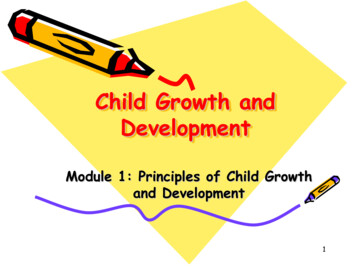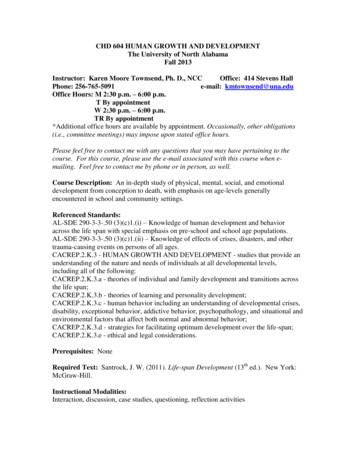
Transcription
CHD 604 HUMAN GROWTH AND DEVELOPMENTThe University of North AlabamaFall 2013Instructor: Karen Moore Townsend, Ph. D., NCCOffice: 414 Stevens HallPhone: 256-765-5091e-mail: kmtownsend@una.eduOffice Hours: M 2:30 p.m. – 6:00 p.m.T By appointmentW 2:30 p.m. – 6:00 p.m.TR By appointment*Additional office hours are available by appointment. Occasionally, other obligations(i.e., committee meetings) may impose upon stated office hours.Please feel free to contact me with any questions that you may have pertaining to thecourse. For this course, please use the e-mail associated with this course when emailing. Feel free to contact me by phone or in person, as well.Course Description: An in-depth study of physical, mental, social, and emotionaldevelopment from conception to death, with emphasis on age-levels generallyencountered in school and community settings.Referenced Standards:AL-SDE 290-3-3-.50 (3)(c)1.(i) – Knowledge of human development and behavioracross the life span with special emphasis on pre-school and school age populations.AL-SDE 290-3-3-.50 (3)(c)1.(ii) – Knowledge of effects of crises, disasters, and othertrauma-causing events on persons of all ages.CACREP.2.K.3 - HUMAN GROWTH AND DEVELOPMENT - studies that provide anunderstanding of the nature and needs of individuals at all developmental levels,including all of the following:CACREP.2.K.3.a - theories of individual and family development and transitions acrossthe life span;CACREP.2.K.3.b - theories of learning and personality development;CACREP.2.K.3.c - human behavior including an understanding of developmental crises,disability, exceptional behavior, addictive behavior, psychopathology, and situational andenvironmental factors that affect both normal and abnormal behavior;CACREP.2.K.3.d - strategies for facilitating optimum development over the life-span;CACREP.2.K.3.e - ethical and legal considerations.Prerequisites: NoneRequired Text: Santrock, J. W. (2011). Life-span Development (13th ed.). New York:McGraw-Hill.Instructional Modalities:Interaction, discussion, case studies, questioning, reflection activities
Student Outcomes, Course Competencies and Objectives:After successful completion of this course, students should be able to demonstrateknowledge and understanding of the following:1. Human development and behavior across the life span with special emphasison pre-school and school age populations (AL-SDE 290-3-3-.50 (3)(c)1.(i)).2. The effects of crises, disasters, and other trauma-causing events on persons ofall ages (AL-SDE 290-3-3-.50 (3)(c)1.(ii)).3. Theories of individual and family development and transitions across the lifespan (CACREP.2.K.3.a; CACREP.2.K.3.b).4. Human behavior including problems associated with missing stages, notgetting what is developmentally needed, and environmental factors that affectboth normal and abnormal behavior (CACREP.2.K.3.c).5. Strategies to facilitate growth in development (CACREP.2.K.3.d).6. Ethical and legal considerations (CACREP.2.K.3.e).EvaluationCourse RequirementsMidterm exam – 12.5%Final exam – 12.5%Autobiography – 12.5%PowerPoint Presentation – 12.5%Semester Project – 12.5%Discussion Postings & Responses – 12.5%Quizzes 12.5%Student Participation – 12.5%Outcomes & CompetenciesObjectives 1, 2, 5, 6Objectives 1, 2, 5, 6Objectives 4Objectives 3,Objectives 1, 3, 4Grading Scale:A 90% - 100%, B 80% - 89%, C 70% - 79%, D 60% - 69%, F Below 60%Description of Course Requirements:1. Students should complete all assignments for each learning module. Studentsshould refer to the due dates listed on the Course Schedule.2. There will be 2 examinations—a midterm exam and a final exam. Each examwill be worth 12.5% of the final grade.3. Each student will write an autobiography, 7 – 8 pages in length. A coverpage, not included in the required length, should be attached. Theautobiography should relate major events of the student’s life at differentstages to one or more developmental theory/theories covered in the text and/orother class assignments. No bibliography is required. Correct spelling andgrammar are required. The paper should adhere to APA format and should bedouble spaced using APA approved font. The autobiography should besubmitted to the instructor by using the Autobiography Drop Box and should
4.5.6.7.not be posted for class viewing. The autobiography will count as 12.5% of thefinal grade.Students will respond to at least 1 discussion question for each learningmodule. Discussion questions should contain appropriate length to reflectthoughtful response (approximately 100 - 125 words). When posting, thestudent should use his/her name along with DQ (discussion question) and themodule number in the subject line (Ex. Karen Townsend DQ 1). In addition,each week students should read the postings of the other students in the classand then select 1 of the other students’ postings to which they will write andpost a response (minimum of approximately 25 - 50 words each). Studentsshould keep in mind courtesy, respect, and allowance for individualdifferences in viewpoints in responses. Students should review theirresponses before posting to ensure that the intended tone could not bemisunderstood. When posting responses to another student, the student shoulduse his/her name along with DQR (discussion question response) and themodule number in the subject line. Please note that your name should appearin the subject line of a post by you. (Ex. If I am responding to a post by Felixthe Cat for Module 1, the subject line would have my name, not Felix’s, DQR,and the Module number--Karen Townsend DQR 1). The total discussionpostings and responses will be worth 12.5% of the final grade.Students will take on-line “quizzes” on the assigned chapters for each module.Each quiz can be found and is to be taken in the Angel module. However, inanswering questions on the quizzes, students are encouraged to consult theirtextbook or other course-related materials, such as the companion website tothe text-- http://www.mhhe.com/santrockld13eThus, the quizzes are designed to encourage students to seek answers that theymay not readily recall. Quizzes will total 12.5% of the final grade.Students will work in teams to create a PowerPoint presentation, 7 – 10 slides,presenting an overview of a developmental theorist/theory. Students willchoose from a list provided by the instructor. The PowerPoint should reflectcreativity, an understanding of content, as well as practical application forprofessionals. The PowerPoint should cover 3 main areas: (a) Backgroundinformation on the theorist and the theory, (b) Key elements of the theory (forexample, an explanation of the stages of the theory), (c) Applications forprofessionals (for example, why is the theory important; how does this theoryhelp various professionals—counselors, teachers, etc.—in serving clients,students, etc.) The PowerPoint should also provide good review, not only forthe student designing the presentation, but for others in the class, as well. ThePowerPoint presentation is to be posted for others in the class to view. Inaddition, the team should be prepared to present the PowerPoint at adesignated on campus class meeting. The PowerPoint presentation will beworth 12.5% of the final grade.Students will develop an on-going Semester Project, a creative endeavor inwhich students trace the human lifespan from birth to late adulthood (Modules3 through 8). However, the means chosen must be such that the project can beshared through Angel in an on-line format. To earn an A on the project, the
student should trace at least 5 theories through the life span and include atleast 10 key terms from the content each Module included in the project(Modules 3-8). The project should be neat, attractive, and display creativity.The project must provide correct information. Also, the project should havefewer than 3 misspelled words or grammatical errors. To earn a B on theproject, the student should trace at least 3 theories through the life span andinclude at least 5 key terms from the content of each Module (Modules 3-8).The project should be neat, attractive, and display creativity. The project mustprovide correct information. Also, the project should have fewer than 5misspelled words or grammatical errors. A grade of C, D, or F may be givento projects that fail to meet the above criteria. While the project will receive agrade after the completion of the project, additional checkpoints at Module 4and Module 6 have been established. Check the Course Schedule for thesedates. Failure to post proper information at the first or second checkpoint mayreduce the grade of the final project by 5 points for each checkpoint for whichthe project thus far was not successfully submitted. At the final due date theproject in its entirety should be submitted for the project grade. Projects willbe viewable by other students in this class. Students are encouraged to viewthe posts of their peers. The Semester Project is worth 12.5 % of the finalgrade.8. Student participation is worth 12.5% of the final grade.Student performance of all course requirements will be evaluated according to thefollowing descriptors:Score A (90 – 100); Descriptor Exceptional; Explanation: The studentdemonstrates exceptional understanding and/or skill expected.Score B (80-89); Descriptor Proficient; Explanation: The student demonstratesproficient understanding and/or skill expected.Score C (70-79); Descriptor Basic; Explanation: The student demonstrates a basiclevel of understanding and/or skill expected.Score D (60 – 69) or F (below 60); Descriptor – Unacceptable; Explanation: Thecandidate does not demonstrate a minimum level of understanding and/or skill expected;unsatisfactory.Please note: For all course requirements part of the grade will be a professional,subjective decision by the instructor.Completion of Course Activities/AssignmentsAttendanceUNA’s attendance policy states “Graduate work is based on levels of maturity andseriousness of purpose which assume regular and punctual class attendance. In order toprotect academic status, circumstances necessitating extended absences should be thebasis for conferral with the appropriate college dean. Each student is directly responsibleto the individual professor for absences and for making up work missed. Particularpolicies and procedures on absences and makeup work are established in writing for each
class, are announced by the professor at the beginning of the term, and for excessiveabsences, may provide for appropriate penalties including reduction in grades orprofessor-initiated withdrawal from class. Official written excuses for absences are issuedonly for absences incurred in connection with university-sponsored activities. For allother types of group or individual absences, including illness, authorization or excuse isthe province of the individual professor.” (p.33)All faculty in the Counselor Education department have adopted the following policy:If a student misses more than four classes, that student will be required to withdraw fromthe course. If the fifth absence occurs after the withdrawal deadline, the student willreceive a failing grade.Therefore, given the nature of this course as an on-line class, if a student fails to completethe assignments for more than four weeks, he or she will be given the opportunity towithdraw from the class. If the student does not withdraw, he or she will receive a failinggrade for the course.Academic HonestyStudents of the university academic community are expected to adhere to commonlyaccepted standards of academic honesty. Allegations of academic dishonesty can reflectpoorly on the scholarly reputation of the University including students, faculty andgraduates. Individuals who elect to commit acts of academic dishonesty such as cheating,plagiarism, or misrepresentation will be subject to appropriate disciplinary action inaccordance with university policy.Incidents of possible student academic dishonesty will be addressed in accordance withthe following guidelines:1.2.3.The instructor is responsible for investigating and documenting any incident ofalleged academic dishonesty that occurs under the instructor’s purview.If the instructor finds the allegation of academic dishonesty to have merit, then theinstructor, after a documented conference with the student, will develop a plan fordisciplinary action. If the student agrees to this plan, then both instructor andstudent will sign the agreement. The faculty member will forward a copy of thesigned agreement to the Office of Student Conduct for record-keeping purposes.If the student disagrees with the instructor’s proposed plan for disciplinary actionand wishes to take further action, he/she is responsible for scheduling a meetingwith the chair of the department where the course is housed to appeal theproposed disciplinary plan. The department chair shall mediate the matter andseek a satisfactory judgment acceptable to the faculty member based on meetingswith all parties. If a resolution is reached, the disposition of the case will beforwarded to the Office of Student Conduct. If a resolution at the departmentallevel is not reached and the student wishes to take further action, he/she isresponsible for scheduling a meeting with the dean of the college where thecourse is housed to appeal the proposed disciplinary plan. The college dean shallmediate the matter and seek a satisfactory judgment acceptable to the faculty
member based on meetings with all parties. If a resolution is reached, thedisposition of the case will be forwarded to the Office of Student Conduct. If aresolution at the college level is not reached and the student wishes to take furtheraction, he/she is responsible for scheduling a meeting with the Vice President forAcademic Affairs and Provost (VPAA/P) to appeal the proposed disciplinaryplan. The VPAA/P shall mediate the matter and seek a satisfactory judgmentacceptable to the faculty member based on meetings with all parties. Afterreviewing all documentation, the VPAA/P may, at his/her discretion, chooseeither to affirm the proposed action, to refer the case to the Office of StudentConduct for further review, or to dismiss the matter depending on the merits ofthe case. The final disposition of the case will be disseminated to appropriateparties, including the Office of Student Conduct.If a student is allowed academic progression but demonstrates a repeated patternof academic dishonesty, the VPAA/P may, after consultation with the Office ofStudent Conduct, assign additional penalties to the student, including removalfrom the University.4.Accommodation StatementIn accordance with the Americans with Disabilities Act (ADA) and Section 504 of theRehabilitation Act of 1973, the University offers reasonable accommodations to studentswith eligible documented learning, physical and/or psychological disabilities. Under TitleII of the Americans with Disabilities Act (ADA) of 1990, Section 504 of theRehabilitation Act of 1973, and the Americans with Disabilities Amendment Act of 2008,a disability is defined as a physical or mental impairment that substantially limits one ormore major life activities as compared to an average person in the population. It is theresponsibility of the student to contact Disability Support Services to initiate the processto develop an accommodation plan. This accommodation plan will not be appliedretroactively. Appropriate, reasonable accommodations will be made to allow eachstudent to meet course requirements, but no fundamental or substantial alteration ofacademic standards will be made. Students needing assistance should contact DisabilitySupport Services (256-765-4214).Emergency ProceduresUpon hearing the fire/emergency alarm, or when instructed by the building coordinator todo so, students will evacuate the building under the supervision of the faculty and staff.While evacuating, please keep in mind the following: Assist persons with physical disabilities, if needed.Do not use the elevators.Time permitting, close all doors and windows.Alert others in the building as you exit.Faculty, staff and students will stay in a designated assembly area until notified otherwiseby authorized personnel, including UNA facilities staff, UNA Police Officers, UNAAdministrators, or Fire Department personnel.
Electronic DevicesCell phones and other electronic devices are not permitted in class and should not bevisible or audible. If a student needs cell phone access for a personal emergency or oncall work situation, the student may keep the phone visible and in vibrate or silent mode.Permission of the instructor must be obtained prior to class in these situations.Assignments submitted for this course shall not contain any portion of materialssubmitted in another course.Five points may be deducted for each day beyond the due date that late assignments aresubmitted.Course Content:Introduction: Requirements for Course, Objectives, Schedule, Questions, AssignmentsChapter One: Developing a Concept of How Behavior and Responses to Life EventsIncluding Crises, Disasters, and Other Trauma-causing Events, Become Adoptedby Individuals; Developmental Stage Models and Theories; Learning Theories;Incremental Models; Multidimensional/Systems Models; Life Span Development,Ethics and ResearchChapters Two, Three, Four, Five, Six, Seven, and Eight: First Three States of Life;Theory and Responses to Individuals; Effects of Heredity and Environment;Neural, Cognitive, Emotional, Individual, and Social Development in EarlyYears; Impact of Family; Counseling and Professional Implications and StrategiesChapters Nine, Ten, Eleven, and Twelve: The Middle Childhood Years and AdolescentYears-Cognitive, Physical, Sexual, Individual, Identity, and Moral Development;Social Relationships Including Gender and Peer Relationships, Family Relations,Leisure and Service Learning; Impact of Media; Normal, Abnormal, and RiskyBehavior; Social Deviance; Counseling and Professional Implications andStrategiesChapters Thirteen, Fourteen, Fifteen, and Sixteen: Young and Middle Adulthood andStages-Physical, Cognitive, Socioemotional, Personality, Vocational, and Career;Leisure; Religion and Meaning; Development and Theories; Change andTransition; Lifespan; Generativity; Counseling and Professional Implications andStrategiesChapters Seventeen, Eighteen, Nineteen, and Twenty: Later Adult Years and Stages –Management, Coping, Well-being; Work and Retirement; Life Satisfaction;Dealing with Loss, Death, Dying; Counseling and Professional Implications andStrategies
Referenced Standards, College of Education Conceptual Framework:UNIVERSITY OF NORTH ALABAMACOLLEGE OF EDUCATIONCONCEPTUAL FRAMEWORK“Engaging Learners,Inspiring Leaders,Transforming Lives”The College of Education’s Conceptual Framework, which is continuously evaluated in an outcome-basedsystem, establishes a shared vision in preparing educators to work effectively in P-12 schools; providesdirection for programs, courses, teaching, candidate performance, scholarship, service and accountability;and is knowledge-based, articulated, shared and consistent with the University of North Alabama’sinstitutional mission:“Changing lives. Creating futures.”The Conceptual Framework is designed to reflect current research-based knowledge and effective practicesthrough professionalism, assessment, collaboration, technology, diversity and reflection.The UNA College of Education prepares “Knowledgeable Practicing Professionals” who: Demonstrate professionalism through a set of beliefs, actions, dispositions and ethical standardsthat form the core of their practice; Have the knowledge and ability to use assessment strategies to guide teaching and learning,especially impact on student learning, and to strengthen instruction and increase professionalgrowth; Form communities of learners through collaboration, teamwork and research-based approaches;
Use technology to support assessment, planning and instruction for promoting student learning; Value and plan for diversity in curriculum development, instructional strategies and in thepromotion of social consciousness; Know and use self-awareness and reflection as decision-making tools for assuring studentlearning, professional performance and personal growth.Graduates of the University of North Alabama’s College of Education are knowledgeable, practicingprofessionals who are prepared as outstanding educators and leaders through achievement of the higheststandards of knowledge and practice to assist all candidates to learn.Revised November 2007Signature: After you have had a chance to read the syllabus and ask any questions(through e-mail, phone, or in person), please go to the Lessons tab in Angel and click onthe Drop Box for Syllabus Confirmation icon. Follow the directions given there tosubmit your Syllabus Confirmation.I have received the syllabus for CHD 604. I have read the syllabus and have been offeredan opportunity to ask questions about it. I understand and agree to the requirements inthis syllabus.NameDate
CHD 604 Human Growth and DevelopmentFall 2013The University of North AlabamaCourse ScheduleThe following dates are the due dates for each item listed. Discussion question postingsare due at 4:00 p.m. on the due date. Discussion question response postings are due at4:00 p.m. on the due date. Quizzes, exams, and all other assignments are due at11:55 p.m. of the due date. Please be aware that the clock you are referring to may beslightly off from the time on the Angel server. Please also realize that some Modulescontain more than one chapter (see for example, Module 4). Although there is a due datefor the quizzes of the Module, students may opt to take one or more chapter quizzesbefore the due date.Please note that regardless of what date the Angel program may show as the due date ofan assignment, the correct due date is that shown on this document. There may be timesthat I may have to open an assignment (say, if a student has a personal emergency).When this happens, it causes the due date for that item to change for the entire class onthe Angel program. This is impossible for me to control. Therefore, it is imperative thatyou regard only the due dates shown on this document as the correct due dates.Module 1 Introduction to CourseAugust 26—Module 1 Syllabus ResponseModule 1 Discussion QuestionAugust 28—Module 1 Discussion Question ResponsesON CAMPUS CLASS MEETING—AUGUST 29, 4:00 p.m.
Module 2 Chapter 1 The Life-span PerspectiveRead Chapter 1 and complete assigned activities (websites, PowerPoints, etc.)*September 3—Module 2 Discussion Question*Please note that due to Labor Day holiday, the Discussion Question isdue on Tuesday. Typically, the Discussion Question will be due onMonday.September 4—Module 2 Discussion Question ResponsesModule 2 Quiz on Ch. 1AUTOBIOGRAPHY—Due SEPTEMBER 5Module 3 Chapters 2, 3, 4, 5, 6 Beginnings and InfancyRead Chapters 2, 3, 4, 5, 6 and complete assigned activitiesSeptember 9—Module 3 Discussion QuestionSeptember 11—Module 3 Discussion Question ResponsesModule 3 Quiz on Ch. 2Module 3 Quiz on Ch. 3September 18—Module 3 Quiz on Ch. 4Module 3 Quiz on Ch. 5Module 3 Quiz on Ch. 6Module 4 Chapters 7, 8 Early ChildhoodRead Chapters 7, 8 and complete assigned activitiesSeptember 23—Module 4 Discussion QuestionSeptember 25—Module 4 Discussion Question ResponsesModule 4 Quiz on Ch. 7Module 4 Quiz on Ch. 8CHECKPOINT FOR SEMESTER PROJECT—OCTOBER 1Module 5 Chapters 9, 10 Middle and Late ChildhoodRead Chapters 9, 10 and complete assigned activitiesOctober 7—Module 5 Discussion Question
October 9—Module 5 Discussion Question ResponsesModule 5 Quiz on Ch. 9Module 5 Quiz on Ch. 10ON CAMPUS CLASS MEETING FOR MIDTERM EXAM—OCTOBER 16, 4:00p.m.POWERPOINT PRESENTATIONS DUE—OCTOBER 22ON CAMPUS CLASS MEETING TO VIEW MEMBERS’ POWERPOINTPRESENTATIONS—OCTOBER 23, 4:00 p.m.Module 6 Chapters 11, 12 AdolescenceRead Chapters 11, 12 and complete assigned activitiesOctober 28—Module 6 Discussion QuestionOctober 30—Module 6 Discussion Question ResponsesModule 6 Quiz on Ch. 11Module 6 Quiz on Ch. 12CHECKPOINT FOR SEMESTER PROJECT—NOVEMBER 4Module 7 Chapters 13,14 Early AdulthoodRead Chapters 13, 14 and complete assigned activitiesNovember 11—Module 7 Discussion QuestionNovember 13—Module 7 Discussion ResponsesModule 7 Quiz on Ch. 13Module 7 Quiz on Ch. 14Module 8 Chapters 15, 16, 17, 18, 19, 20 Middle and Late Adulthood, EndingsRead Chapters 15, 16, 17, 18, 19, 20 and complete assigned activitiesNovember 18—Module 8 Discussion QuestionNovember 20—Module 8 Discussion ResponsesModule 8 Quiz on Ch. 15Module 8 Quiz on Ch. 16
Module 8 Quiz on Ch. 17November 27—Module 8 Quiz on Ch. 18Module 8 Quiz on Ch. 19Module 8 Quiz on Ch. 20SEMESTER PROJECTS DUE—DECEMBER 2ON CAMPUS MEETING FOR FINAL EXAM—DECEMBER 4, 4:00 p.m.Please note that this schedule should be considered tentative. As a tentative courseschedule, the option exists for the instructor to amend deadlines and/or course activitiesbased on the perceived needs of the students. However, no amendment will be made toincrease the class requirements.
development from conception to death, with emphasis on age-levels generally encountered in school and community settings. Referenced Standards: AL-SDE 290-3-3-.50 (3)(c)1.(i) – Knowledge of human development and behavior across the life span with s
